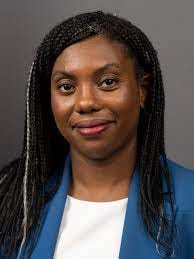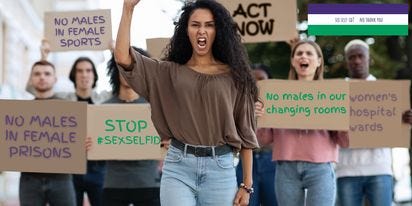How to get it right
A model for evidenced-based government policy
On 6 December in a House of Commons question time, Kemi Badenoch, the Equalities Minister, highlighted the negative effects of gender ideology on laws, policies, education, sport, and safety and the urgent need for legislation to rectify the problems.
“I am glad that we in the UK are setting a standard for evidence-based policymaking and are showing others how to get this right.”
Aotearoa’s new Ministers of Education, Justice, Internal Affairs, Women, and Sport would do well to watch and learn.
Watch the video of the question time here or read the Hansard transcript.
Strongly critical of sex self-ID and its widespread unintended consequences, Badenoch made the following comments during the debate.
(All quotations are direct from Hansard, although not presented in chronological order.)
Protecting children
I certainly support any effort to clarify the law, and we should start from first principles. No child is born in the wrong body, and no child should be put on a pathway towards irreversible medical transition. I am also conscious that it will take time to amend law, and I am therefore focusing on what will work for now. That is why we are publishing guidance to give clarity to schools as soon as possible.
We are seeing, I would say, almost an epidemic of young gay children being told that they are trans and being put on a medical pathway for irreversible decisions, and they are regretting it.
This is what I am doing for young LGBT children: I am making sure that they do not find themselves being sterilised because they are being exploited by people who do not understand what these issues are. I am saying this on the advice of clinicians and academics, because clinicians from the Tavistock clinic have been whistleblowing, talking about what these issues are. The hon. Gentleman says that he is traumatised; we are traumatised by what is happening to young children, and we will run away from this issue no longer.
No to gender ideology in schools
Social transitioning is not a neutral act, as it has been recognised that it can have formative effects on a child’s future development… We are taking this very seriously. We will have the gender questioning guidance out very shortly, and I hope it will address many of the issues he* is concerned about. (*the MP who asked the question.)
We should not treat parents as the enemy. They need to know what is going on because, quite a lot of the time, gender-questioning children have comorbidities—perhaps they are autistic or perhaps there is something else going on in the mental health space that needs clinical advice, rather than just putting them on the social transitioning pathway.
(In reply to a question about the Genderbread Person) As we have not provided clarity in the law, a lot of the space has been filled by many dubious organisations that produce very dubious material with no basis whatsoever in biology or law. They push it because they think that they can get away with it. We as a Government have a responsibility to clear out that material from schools.
As my hon. Friend made clear, it is important that primary school children in particular are protected. That is why the guidance that we will put out on gender-questioning children will address that issue—except in the most extreme safeguarding cases—and I expect it to include clinical advice.
“We should not be socially transitioning any primary school children at all, or introducing them to those theories.”
Closing Loopholes
The way I would explain it is that this is not an issue that we had before. I wish that we did not have to make these changes, but the fact is that many trans people were living their lives peacefully and with dignity until others started exploiting the loopholes. It is not transpeople whom we are trying to limit; it is the predators who are using the loopholes and giving the trans community a bad name.
We are trying to protect against the example that I used before: male prisoners claiming that they are female and going into female prisons. We need to continue to provide clarity, because many public authorities are confused and do not understand. People should use the toilets for their biological sex in the vast majority of cases. In some cases, that will be difficult, but we need to provide more clarity so that predators do not exploit the loophole. That is what we are trying to do.
In the time since that Bill (Conversion Therapies Prohibition) was first promised, the issue has developed. Girls such Keira Bell, who was rushed on to puberty blockers by the NHS and had a double mastectomy, now regret the irreversible damage done to them.
“Now, the threat to many young gay people is not conversion relating to their sexuality, but conversion relating to gender identity.”
I believe that this is a new form of conversion therapy. Respected clinicians, such as those who left Tavistock, have made clear that they are fearful of giving honest clinical advice to a child because if they do not automatically affirm and medicalise a child’s new gender, they will be labelled transphobic. Any Bill needs to address many of those issues, and that is why we are going to publish a draft Bill.
A call for genuine debate
I would say to people across the House that calling people transphobic and calling them bigots when they express concern is creating a chilling effect.
I had a group of schoolchildren, teenage girls, in my office who told me that because of mixed-sex sports they are bullied and pushed around—one of them talked about her glasses being broken—because the boys are using the opportunity to bully.
We should think about children and we should think about protecting them, so I disagree with the labelling of anyone who has a different opinion as transphobic. That is what is causing the problems in this debate, and I am determined to bring some light rather than the heat that others continue to generate.
“We will bring in measures to help people understand exactly what is going on. We should not assume that the knowledge we have in this House is present in the population. I have met people who do not understand the difference between being gay and being trans.”
Let us have the debate in this House, rather than having people out there have the debate, which creates the climate of fear that many have referred to. The harder they make it for people to speak honestly in this Chamber, the worse the situation will get, so I urge Members across the House to listen to my right hon. Friend, because the point he has made is really important. We in this House need to set an example; shouting, barracking and calling people “bigot” and “transphobic” is not going to help LGBT people in this country.
Non-partisan solution needed
This cannot be a left or right issue, and it cannot be an issue on which certain people are personally invested in their own campaigns and cannot see the other point of view; it needs to be something that we work on together, on both sides of the House.






It's a very good point that these gender ideology travesties have happened because laws and policies have been made with no one, or not enough people, qualified to implement the changes they demanded. That work was outsourced to the same organisations which pushed for the changes of policy and legislation, with no scrutiny of their qualifications to do so, because once again, no one was qualified to do that scrutiny.
Her saying that calling people transphobic and bigots is unhelpful was good, amongst everything else which was fantastic. Sounds like a good conversation for our parliament.